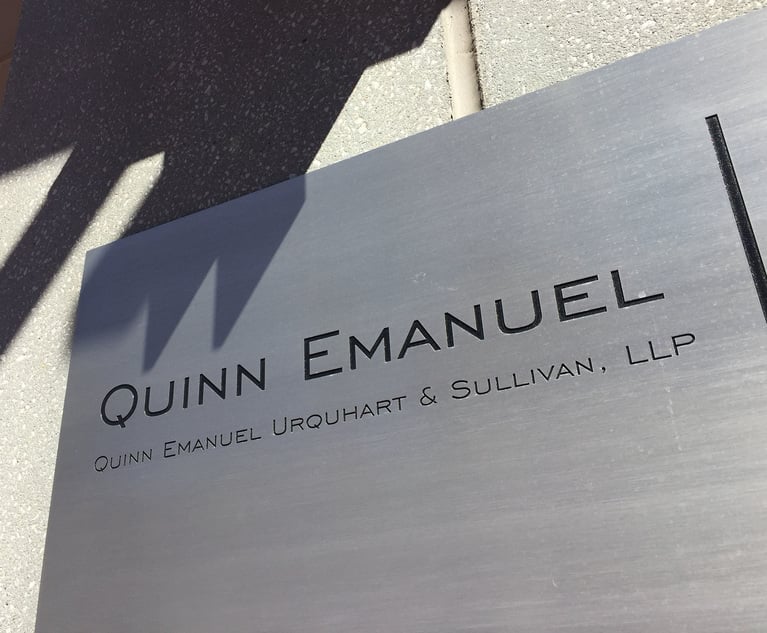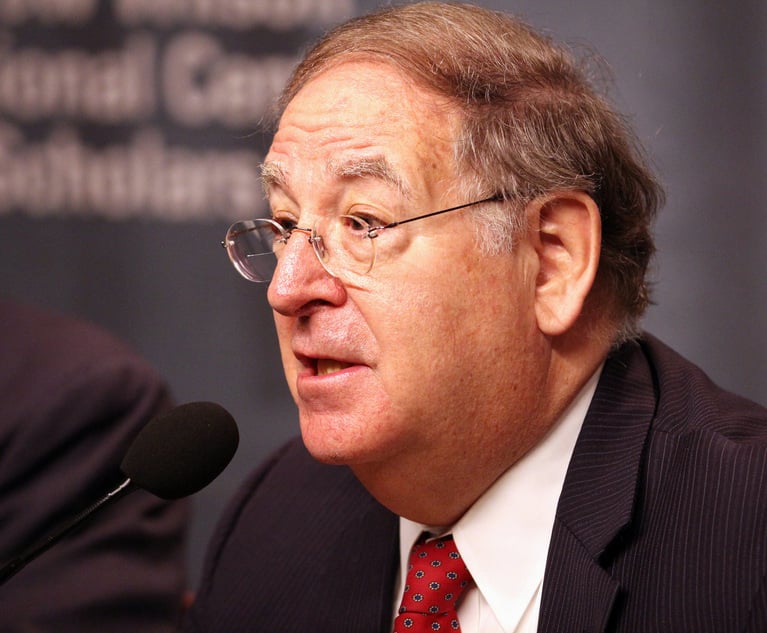Judge in Opioid Cases Orders Disclosure of Litigation Financing
A federal judge overseeing the multidistrict litigation over the opioid epidemic has ordered lawyers to disclose all third-party financing arrangements in their cases.
May 07, 2018 at 06:28 PM
6 minute read
 Judge Dan Polster.
Judge Dan Polster.
A federal judge overseeing the multidistrict litigation over the opioid epidemic has ordered lawyers to disclose all third-party financing arrangements in their cases.
On Monday, U.S. District Judge Dan Polster of the Northern District of Ohio, who is overseeing hundreds of lawsuits brought by governmental entities against the manufacturers and distributors of opioids, ordered lawyers working on contingency to submit a letter identifying the financing for in camera review. He also ordered each lawyer and lender to submit sworn affirmations stating that the financing does not create any conflicts of interest, “undermine counsel's obligation of vigorous advocacy,” affect the lawyer's judgment, give the lender “control over litigation strategy or settlement decisions,” or affect the litigant's control of the settlement.
“It has come to the court's attention that there may be attorneys who represent parties in cases transferred to this MDL court who have obtained (or are contemplating) third-party contingent litigation financing in connection with those MDL cases,” wrote Polster. “By 'third-party contingent litigation financing,' the court refers to any agreement under which any person, other than an attorney permitted to charge a contingent fee representing a party, has a right to receive compensation that is contingent on and sourced from any proceeds of an MDL case, by settlement, judgment, or otherwise.”
He added that he would sanction attorneys or lenders who lied about their arrangements, and he would consider unenforceable any financial arrangements that did not comply with the order.
Plaintiffs lawyers spearheading the opioid MDL said the order came as no surprise.
“It's not at all surprising as it is common practice in complex MDLs for the MDL judge to ensure that no third party of any kind has influence over attorney judgment,” wrote co-lead plaintiffs counsel Paul Hanly, of Simmons Hanly Conroy in New York. “Not at all unwelcome.”
Joseph Rice of Motley Rice, another co-lead counsel, issued a statement on behalf of the plaintiffs executive committee: “It is not unusual for an MDL judge to request such information concerning third-party financing by individual attorneys, and the PEC is in agreement that to the extent such arrangements exist, those attorneys should provide the requested information to Judge Polster.”
But many experts in litigation financing said such an order, while not unheard of, is rare.
“This was the first I've seen where a judge in an MDL, not a class action, has issued this type of order,” said Charles Agee of Westfleet Advisors in Nashville, Tennessee.
His litigation financing firm's research found about 30 orders in individual cases involving outside funding disclosures. Most of those orders have either asked for the funding agreement or allowed limited discovery on the arrangements—all on a heavily redacted basis.
“I don't think I've ever seen an order, in an individual case, where the judge is asking for a co-signed letter with the funder and attorney,” he said.
Anthony Sebok, a professor at Benjamin N. Cardozo School of Law at Yeshiva University in New York, who consults with Burford Capital, agreed.
“This is the first MDL order I've seen like this,” he said. But, he noted, it's one that litigation financiers can live with because the disclosure requirements are “of an extremely minimal nature.”
Travis Lenkner of Chicago's Keller Lenkner, declined to say whether third-party financing was behind five class actions his firm filed last week over the opioid epidemic. But Lenkner, who co-founded Gerchen Keller Capital, now part of Burford Capital, said the order “strikes a good balance.”
In particular, Polster's order barred all discovery about outside financing “absent extraordinary circumstances.” The judge, once exclusively focused on obtaining a global settlement, allowed some discovery to go forward last month.
The order comes amid a growing effort among corporate groups to force disclosures of outside funding in contingency fee cases. The U.S. Chamber of Commerce's Institute for Legal Reform and other business groups have called on Congress and the Judicial Conference Advisory Committee on Rules of Civil Procedure to consider a rule mandating such disclosures in class actions and in multidistrict litigation. The U.S. District Court for the Northern District of California adopted a rule last year in class actions, and Wisconsin's Legislature passed a law this year requiring such disclosures in state court cases.
Burford CEO Christopher Bogart, noting those efforts, called the order a “welcome example of litigation finance disclosure done right” and “a model for other judges to follow.” In particular, he praised the order's focus on confidentiality and kibosh on discovery.
“While it's clear that there is some desire in some corners of the American legal system for there to be disclosure of litigation finance arrangements in certain U.S. court proceedings, especially those involving multiple claimants such as class actions and MDLs, current calls for disclosure tend to be sponsored by special interests seeking tactical advantage and framed in a discriminatory way,” he wrote.
A Burford spokeswoman declined to comment on whether the funder was involved in the opioid litigation.
Defense bar groups said Polster's order did not go far enough.
“We are very pleased that this court—like others—recognized the critical importance of disclosure of litigation funding. However, we believe that there should be full disclosure of the funding agreement to all parties in a case, just as defendants are required to disclose and provide insurance agreements to all parties,” wrote Lisa Rickard, president of the Chamber's Institute for Legal Reform. “Full disclosure is particularly important in this litigation where many plaintiffs are governmental entities that shouldn't be secretly signing over potential recoveries to hedge funds.”
Alex Dahl, general counsel of Lawyers for Civil Justice, which has pushed for the change in the civil rules, said the order demonstrates why the issue shouldn't be left up to the courts.
“This ruling acknowledges the serious problems that can result from third-party litigation funding (TPLF), including conflicts of interest, professional responsibility issues and questions about control,” he wrote. “But the ruling fails to provide transparency to the parties in the case, which is key. It also illuminates the need for uniform rules to replace the ad hoc way in which some MDL courts are making up new procedures on a case-by-case basis.”
This content has been archived. It is available through our partners, LexisNexis® and Bloomberg Law.
To view this content, please continue to their sites.
Not a Lexis Subscriber?
Subscribe Now
Not a Bloomberg Law Subscriber?
Subscribe Now
NOT FOR REPRINT
© 2025 ALM Global, LLC, All Rights Reserved. Request academic re-use from www.copyright.com. All other uses, submit a request to [email protected]. For more information visit Asset & Logo Licensing.
You Might Like
View All
Trump Administration Faces Legal Challenge Over EO Impacting Federal Workers
3 minute read
Private Equity Giant KKR Refiles SDNY Countersuit in DOJ Premerger Filing Row
3 minute read
Quinn Emanuel Files Countersuit Against DOJ in Row Over Premerger Reporting
3 minute read
'Thoughtful Jurist': Maryland US District Senior Judge Messitte Dies After Short Illness
4 minute readTrending Stories
- 15th Circuit Considers Challenge to Louisiana's Ten Commandments Law
- 2Crocs Accused of Padding Revenue With Channel-Stuffing HEYDUDE Shoes
- 3E-discovery Practitioners Are Racing to Adapt to Social Media’s Evolving Landscape
- 4The Law Firm Disrupted: For Office Policies, Big Law Has Its Ear to the Market, Not to Trump
- 5FTC Finalizes Child Online Privacy Rule Updates, But Ferguson Eyes Further Changes
Who Got The Work
J. Brugh Lower of Gibbons has entered an appearance for industrial equipment supplier Devco Corporation in a pending trademark infringement lawsuit. The suit, accusing the defendant of selling knock-off Graco products, was filed Dec. 18 in New Jersey District Court by Rivkin Radler on behalf of Graco Inc. and Graco Minnesota. The case, assigned to U.S. District Judge Zahid N. Quraishi, is 3:24-cv-11294, Graco Inc. et al v. Devco Corporation.
Who Got The Work
Rebecca Maller-Stein and Kent A. Yalowitz of Arnold & Porter Kaye Scholer have entered their appearances for Hanaco Venture Capital and its executives, Lior Prosor and David Frankel, in a pending securities lawsuit. The action, filed on Dec. 24 in New York Southern District Court by Zell, Aron & Co. on behalf of Goldeneye Advisors, accuses the defendants of negligently and fraudulently managing the plaintiff's $1 million investment. The case, assigned to U.S. District Judge Vernon S. Broderick, is 1:24-cv-09918, Goldeneye Advisors, LLC v. Hanaco Venture Capital, Ltd. et al.
Who Got The Work
Attorneys from A&O Shearman has stepped in as defense counsel for Toronto-Dominion Bank and other defendants in a pending securities class action. The suit, filed Dec. 11 in New York Southern District Court by Bleichmar Fonti & Auld, accuses the defendants of concealing the bank's 'pervasive' deficiencies in regards to its compliance with the Bank Secrecy Act and the quality of its anti-money laundering controls. The case, assigned to U.S. District Judge Arun Subramanian, is 1:24-cv-09445, Gonzalez v. The Toronto-Dominion Bank et al.
Who Got The Work
Crown Castle International, a Pennsylvania company providing shared communications infrastructure, has turned to Luke D. Wolf of Gordon Rees Scully Mansukhani to fend off a pending breach-of-contract lawsuit. The court action, filed Nov. 25 in Michigan Eastern District Court by Hooper Hathaway PC on behalf of The Town Residences LLC, accuses Crown Castle of failing to transfer approximately $30,000 in utility payments from T-Mobile in breach of a roof-top lease and assignment agreement. The case, assigned to U.S. District Judge Susan K. Declercq, is 2:24-cv-13131, The Town Residences LLC v. T-Mobile US, Inc. et al.
Who Got The Work
Wilfred P. Coronato and Daniel M. Schwartz of McCarter & English have stepped in as defense counsel to Electrolux Home Products Inc. in a pending product liability lawsuit. The court action, filed Nov. 26 in New York Eastern District Court by Poulos Lopiccolo PC and Nagel Rice LLP on behalf of David Stern, alleges that the defendant's refrigerators’ drawers and shelving repeatedly break and fall apart within months after purchase. The case, assigned to U.S. District Judge Joan M. Azrack, is 2:24-cv-08204, Stern v. Electrolux Home Products, Inc.
Featured Firms
Law Offices of Gary Martin Hays & Associates, P.C.
(470) 294-1674
Law Offices of Mark E. Salomone
(857) 444-6468
Smith & Hassler
(713) 739-1250










